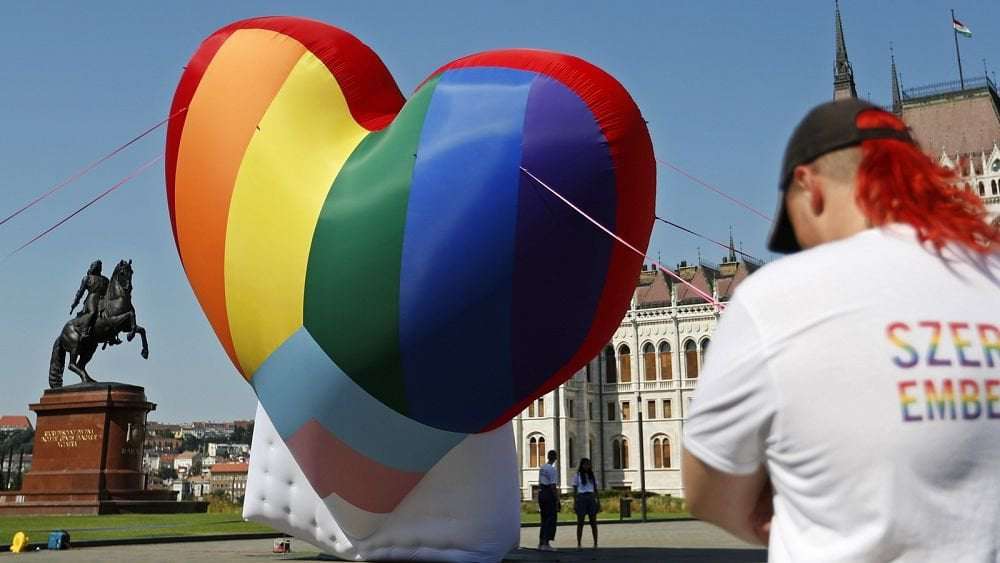A total of 15 European Union countries have joined a legal case against Hungary's Child Protection Law, widely criticised as being anti-LGBT.
Belgium, Luxembourg, Netherlands, Portugal, Austria, Ireland, Denmark, Malta, Spain, Sweden, Finland, Slovenia, France, Germany and Greece, together with the European Parliament, will act as third parties in the lawsuit filed last year by the European Commission.
The deadline to join the case ended on 6 April.
"We stand firm in our commitment to an inclusive society and equality for all," said the Belgian Foreign Affairs Ministry, which had led the charge against the controversial bill.
The Hungarian law, approved in June 2021, contains one provision that prohibits or heavily restricts depictions of homosexuality and gender reassignment in media content and educational material addressed to audiences under 18 years of age.
This triggered a political backlash, with countries signing joint letters and prime ministers openly voicing their discontent with their Hungarian counterpart, Viktor Orbán.
Dutch Prime Minister Mark Rutte went as far as suggesting that if Hungary moved ahead with the plans "as far as I am concerned, then there is nothing left for them in the EU".
The legislation also came under fire for conflating paedophilia with homosexuality, as the text's stated purpose is to strengthen the protection of children against sex offenders.
This bill 'goes against EU values'
The European Commission, which oversees the compatibility of national law with EU rules, asked Hungary to explain why the ban on LGBT content was necessary to achieve the law's main objectives.
Unconvinced by Budapest's reasoning, the EU executive launched an infringement procedure, arguing the legislation infringed upon fundamental rights and several regulations of the single market.
"This Hungarian bill is a shame," European Commission President Ursula von der Leyen said in 2021.
"This bill clearly discriminates against people on the basis of their sexual orientation and it goes against all the fundamental values of the European Union: this is human dignity, it is equality and it's the human fundamental rights. So we will not compromise on these principles."
As Hungary refused to back down, the Commission submitted in July last year a legal case before the European Court of Justice (ECJ), which has the power to impose changes on national legislation.
"The Hungarian law violates EU law, fundamental rights and EU values. We referred Hungary to the ECJ and it is now up to the Court to rule on the case," a European Commission spokesperson told Euronews.
Reacting to the news, Budapest remained defiant and vowed to push ahead with the legislation, citing a 2022 referendum that showed vast support for the government's position but failed to reach the necessary threshold of valid votes.
"For us, the matter of child protection knows no compromises, we will protect our children," Péter Szijjártó, Hungary’s foreign affairs minister, said this week.
"This is not a simple government decision, nor a parliamentary decision, but this is the will of the people, as it was expressed in a referendum and we do not know of a higher-level decision in a democracy. Therefore, of course, we will stand by child protection, by protecting Hungarian children, regardless of how many countries decide to join the ongoing lawsuit against us."
The list of countries that participate in the legal case has a markedly Western component, reflecting a long-standing West-East gap when it comes to the protection of LGBT+ rights in Europe.
Italy, Estonia, Latvia and Cyprus, whose leaders had in 2021 signed a collective letter denouncing the Hungarian law, did not add their names to the lawsuit.
By contrast, Slovenia, which last year became the first former Communist country to allow same-sex couples to marry and adopt, opted in this time around.
It's unclear if any other member state can still become part of the case after the expiration of the deadline, which had already been extended.
Still, the turnout of 15 countries is "ground-breaking," says Katrin Hugendubel, advocacy director at ILGA-Europe, an umbrella NGO that encompasses over 600 entities across Europe and Central Asia.
"It clearly shows that the majority of EU countries wish to actively take steps towards ensuring effective respect for EU law, and the fundamental rights of every citizen in the Union," Hugendubel told Euronews.
"In the understanding that Hungary may ignore a successful infringement, we will continue to monitor the implementation of the anti-LGBTI law to support the Hungarian community and document their human rights violations."

IndeterminateYogurt on April 7th, 2023 at 18:14 UTC »
What a surprise that Poland isn't among those countries.
Loki-L on April 7th, 2023 at 17:49 UTC »
If the Hungarians don't like it they can join some place that shares their values in that regard, like Russia or Afghanistan or Florida.
autotldr on April 7th, 2023 at 17:32 UTC »
This is the best tl;dr I could make, original reduced by 82%. (I'm a bot)
Extended Summary | FAQ | Feedback | Top keywords: Law#1 European#2 country#3 Hungarian#4 Hungary#5